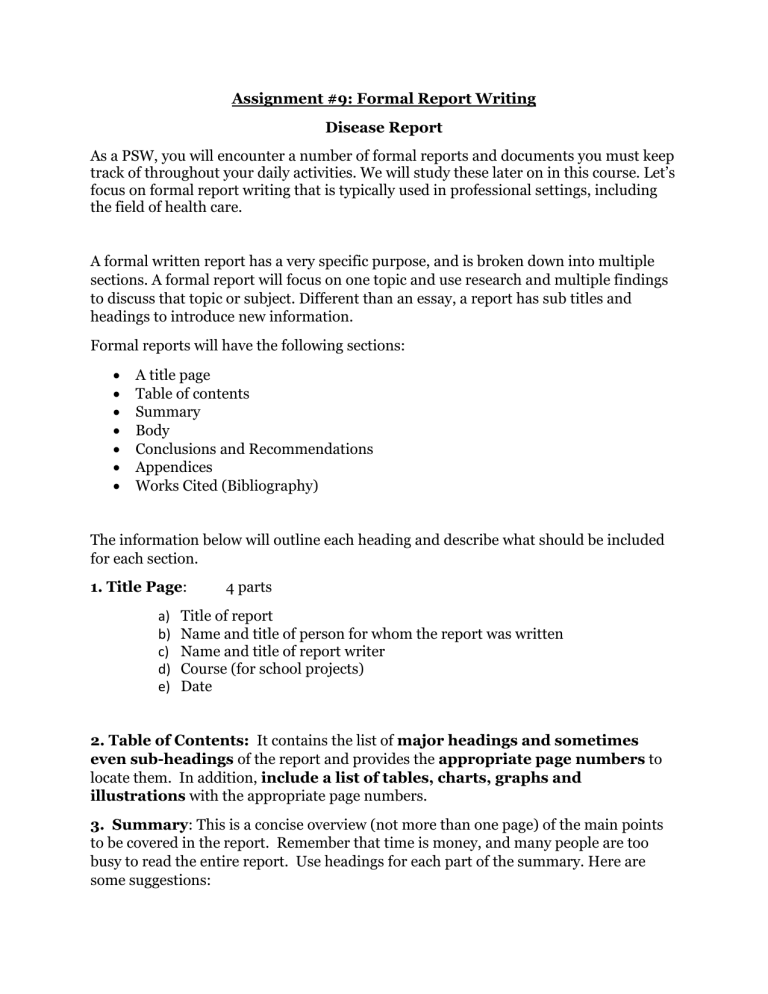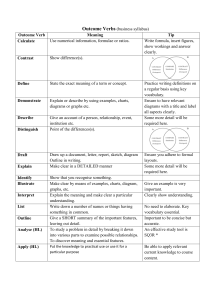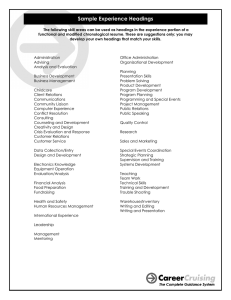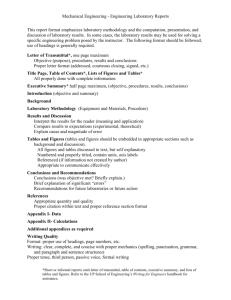
Assignment #9: Formal Report Writing Disease Report As a PSW, you will encounter a number of formal reports and documents you must keep track of throughout your daily activities. We will study these later on in this course. Let’s focus on formal report writing that is typically used in professional settings, including the field of health care. A formal written report has a very specific purpose, and is broken down into multiple sections. A formal report will focus on one topic and use research and multiple findings to discuss that topic or subject. Different than an essay, a report has sub titles and headings to introduce new information. Formal reports will have the following sections: A title page Table of contents Summary Body Conclusions and Recommendations Appendices Works Cited (Bibliography) The information below will outline each heading and describe what should be included for each section. 1. Title Page: a) b) c) d) e) 4 parts Title of report Name and title of person for whom the report was written Name and title of report writer Course (for school projects) Date 2. Table of Contents: It contains the list of major headings and sometimes even sub-headings of the report and provides the appropriate page numbers to locate them. In addition, include a list of tables, charts, graphs and illustrations with the appropriate page numbers. 3. Summary: This is a concise overview (not more than one page) of the main points to be covered in the report. Remember that time is money, and many people are too busy to read the entire report. Use headings for each part of the summary. Here are some suggestions: a) b) c) d) Central problem or issue that necessitated the report Points to be covered Methods of collecting data Outcome Here are some sentence starters to help you begin your Summary:Title This study was to ... The main findings were that ... It was concluded that ... The recommendations are that ... 4. Body: The body begins with a brief introductory paragraph, which lies out as clearly as possible the problem or topic being discussed. Use headings for each part of the body, which is broken down below. a) b) c) d) e) Purpose - writer’s aims and goals in the report Scope - outlines report contents Limitations - material the report does not include Justification - lists and explains the benefits of the report The Present Study - the text or main part of the body, which the evidence to prove your point. presents NOTE: The Present Study contains all of the contents of your report. It is the same as the body paragraphs of an essay. It is written in formal paragraphs and demonstrates your ability to clearly explain what you have researched and discovered. Be thorough and edit carefully to demonstrate your mastery of the English language. 5. Conclusions and Recommendations: Explaining the facts and why the report was written might not be enough. Draw conclusions about your research and evidence in your report and make recommendations on the basis of your research and findings. 6. Appendix: Report writing relies on charts, graphs, diagrams, and photos to provide visual support for the facts being presented. This is crucial because we understand a lot of things better if we can see them. Remember your job is to clearly communicate. Use every means you have to reach this goal, including visual elements. Note: The support materials that you include in the appendix are usually too large and unwieldy to fit into the body of the report. If you tried to put them in, the reader would get lost in the less important facts and graphs and be able to stay focused on the main focus of the report. If the Appendix becomes very large, consider having a table of contents for it as well. Be organized. Help the reader by structuring everything you do to enhance the clarity of what you are communicating. 7. Works Cited – list all of the resources used (websites, books, newspapers, magazines, etc.) Report Writing Checklist When you have completed writing your report, it is a good idea to go over this checklist and check off each of the following boxes when you are happy that you have achieved each point. Is each section properly labelled and titled? Is each section included (title page, table of contents, summary, etc.)? Are the purpose and aims clear? Are the points supported by evidence and research? Is all the information relevant to the purpose? Is the balance between sections ok? Is there any (unnecessary) repetition? Is the order logical? Are the headings clear? Is the information presented clearly? Is there a good use of graphics? Is the language clear and easy to understand? Is the style formal? Are the any unnecessary words or phrases? Is the grammar and punctuation correct? Is the spelling ok? Are the conclusions and recommendations clearly linked to the purpose and based on findings? Have you proofread your report? Is all research and outside info referenced on my Works Cited page? Your Task: You must write a formal report on one of the topics below. You will choose one topic to research. Organize your research into proper report format, with appropriate headings. You must include the following research in your report: description of disease, symptoms, treatment, cure (if applicable), statistics, facts, survival rates, and anything else you think is important. Choose one of the following topics: ASL Osteoporosis Depression Type 2 Diabetes Alzheimer’s Disease Cardiovascular Disease Parkinson’s Disease Arthritis Obesity Vision and Hearing Loss Shingles Cancer


